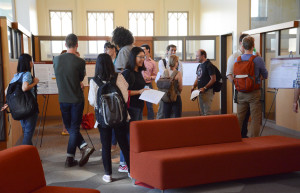
Stanford students gathered to hear CEO of Teach for America (TFA) Elisa Villanueva Beard last Thursday share her wisdom as one of the two keynote speakers for Social Impact Week, hosted by the Business Association for Stanford Entrepreneurial Students (BASES).
In her opening remarks, Villanueva Beard turned to a quote from Teddy Roosevelt and urged Stanford students to “get into the arena, dare greatly, and lead.” As the sole CEO of TFA, after co-CEO Matt Kramer stepped down in September, Villanueva Beard has 17 years of experience working with the organization. TFA now consists of over 50,000 corps members and alumni and reaches a network of over one million students each year, spread across 52 communities in the United States.
“We believe that every kid should have access to equal opportunity and should have an equal shot in life, and we know that education matters so much to that” said Villanueva Beard.
Villanueva Beard experienced first-hand the consequences of a deficient education system. Born and raised in the Rio Grande Valley in South Texas, she faced many of the challenges associated with an impoverished, under-resourced community. She says she found herself painfully unprepared when she arrived at DePauw University to pursue her undergraduate degree. She also found herself frustrated at the number of friends back home who did not pursue college at all.
In her sophomore year of college, Villanueva Beard met a TFA corps member who inspired her to join the organization and take direct action against the severe educational inequality that plagued her own hometown and communities like it across the country.
After graduating from DePauw, Villanueva Beard abandoned her plan to attend law school and become an attorney and instead joined TFA and became a first grade bilingual teacher to 36 children in Phoenix. In the classroom, Villanueva Beard found her passion and her call to action: educational equity for every child.
“The social impact we’re making is we’re creating conscious advocates, change agents, who are doing something about what I believe is the greatest injustice of our time,” said Villanueva Beard.
Over the years, TFA has faced both doubt and criticism. Initially, Teach for America struggled to maintain diversity within its teaching corps. Educators and education policy experts alike argue that the new teachers are not properly equipped to deal with the issues surrounding race and poverty they will face in the classroom.
Under the leadership of Villanueva Beard, TFA has worked to address the lack of diversity. According to Villanueva Beard, this school year a record 49% of TFA teachers are people of color. Just over a month ago, TFA and Alpha Phi Alpha, a traditionally African American fraternity, announced an official partnership established to recruit more African American males to the classroom.
“[The next step] is to create an inclusive community within Teach for America, where all members feel connected with the organization at every level,” Villanueva said.
The organization is also continuing to develop and integrate what it calls a “culturally responsive pedagogy.” Now, before entering the classroom, TFA corps members are trained in understanding self-identity and the social dynamics and diversity of culture they will experience in the communities they serve.
“What we’ve learned is that the way for you to become conscious about these issues of race, class, and privilege is to fully understand your own identity and your own privilege and your own bias,” Villanueva Beard said. “Our culturally relevant pedagogy is really at the core of how we think about educating our kids. In order to do that, you have to be aware of your own culture and identity.”
A common thread throughout Villanueva Beard’s Stanford address was the importance of gaining proximity to the issues of class, race, and privilege that cause such injustice in our community.
“I hear from all these young folks that they want to go into public policy, education policy, and I think that’s awesome,” Villanueva Beard said. “But please don’t do it without having real experience with the real people and the real issues because you cannot be confident in yourself, you cannot read enough to really understand these issues without that experience.”
Villanueva Beard highlighted the difference between learning about exploring social issues in the classroom and the way they exist in real life.
“You can read Savage Inequality, and if you haven’t, you ought to, but you don’t have a visceral action and understanding until you’re actually doing it, living alongside people. Stay proximate to these issues,” she said.
Villanueva Beard ended her address with a call to action, which she said is different for each Stanford student.
“As you prepare to think about your path moving forward, consider this: you are ready to lead, to get into the arena, to make an impact. The call to action might be different for each one of you…but it has to mean getting into the arena. Dare greatly and make change. I believe that you will.”
Please contact Audrey Huynh at ahuynh14 ‘at’ stanford.edu.